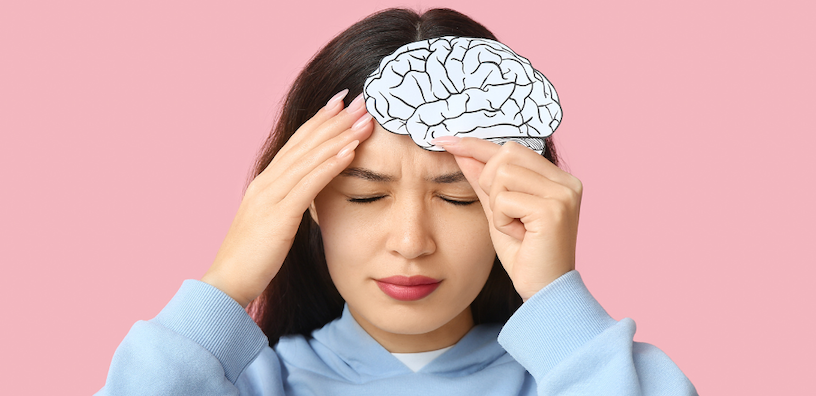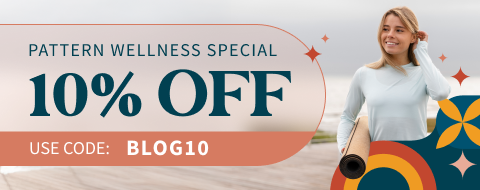Stress is unfortunately an unavoidable part of life, but how we handle it can make all the difference.
April is Stress Awareness Month, a time dedicated to understanding stress, how it affects our well-being, and most importantly, how to manage it.
If you’re feeling stressed and overwhelmed, you’re not alone. The good news though? You can take charge of your stress levels with natural, science-backed techniques.
Keep reading to explore how to reduce stress naturally and enhance your overall well-being.
Understanding Stress: What Happens to Your Body?
When you encounter stress, your body triggers the fight-or-flight response, releasing cortisol and adrenaline. This reaction is helpful at the moment but becomes harmful when stress is constant. Stress impacts nearly every system in your body. Here’s how[1]:
- Brain Function: Chronic stress can disrupt brain areas like the amygdala, hippocampus, and prefrontal cortex, which regulate stress responses. Dysregulation of these areas contributes to stress-related disorders like anxiety, depression, and PTSD.
- Cardiovascular: Acute stress increases heart rate and blood pressure, but chronic stress can lead to heart disease, inflammation, and higher cholesterol.
- Respiratory: Stress causes shallow breathing, making conditions like asthma worse and increasing vulnerability to respiratory infections.
- Digestive: Stress can disrupt digestion, causing issues like diarrhea, constipation, and gut inflammation, while also impairing nutrient absorption.
- Musculoskeletal: Chronic stress triggers muscle tension, headaches, and conditions like fibromyalgia and back pain, while weakening bones over time.
- Immune: Prolonged stress weakens immune function, making you more prone to infections and delaying recovery.
- Reproductive: Stress can cause hormonal imbalances, affecting menstrual cycles in women and sexual health in men, including reduced fertility.
Recognizing stress and its impact is the first step toward effective management.
4 Natural Ways to Manage Stress
Stress might feel unavoidable and never-ending at times, but you don’t have to let it control your life. Here are some simple, natural ways to manage stress that you can easily incorporate into your daily routine:

Take Care of Your Body
The mind-body connection is extremely powerful—when you take care of your physical health, your mental health follows. Start by incorporating some simple lifestyle changes to support your body[2]:
- Exercise: Physical activity helps release endorphins, the body’s natural stress relievers. It doesn’t have to be intense; a quick walk or stretching session can do wonders.
- Eat a Balanced Diet: Nourishing whole foods, like fruits, vegetables, and healthy fats can provide the fuel your body needs to handle stress. If you need a little extra support getting essential nutrients, try incorporating greens powder into your routine.
- Reduce Caffeine: Too much caffeine can leave you feeling jittery and anxious. Try cutting back to maintain steady energy levels and reduce stress.
Take Care of Your Mind
A clear mind leads to a calmer response to life’s challenges. Try some mindfulness and mental practices to help you manage stress[3,4,5]:
- Mindfulness & Yoga: Take a few moments in your day to breathe deeply, stretch, or focus on the present. Simple yoga stretches or breathing exercises can help calm your nervous system.
- Journaling: Sometimes your mind just needs to de-clutter. Try writing down your thoughts and feelings—it's a great way to help you process emotions and find clarity.
- Avoid Procrastination: Stress can build when we delay tasks. Tackling your to-do list in easy to accomplish tasks will help you feel more in control.

Connect with Others & Prioritize Self-Care
Strong social connections and regular self-care are powerful tools for stress management. But remember, setting boundaries to protect yourself is key, too.[6,7]
- Spend Time with Loved Ones: It takes a village—Quality time with family or friends can help you feel supported and reduce feelings of isolation and stress.
- Self-Care: While it may seem hard to do sometimes, make time for yourself! Whether it’s a quiet moment with a book or indulging in a bath, self-care is essential for mental recharge.
- Create Boundaries: Set clear boundaries in your personal and professional life. Saying "no" when necessary is important for protecting your time and preventing burnout.
Support Your Well-Being with Supplements
In addition to lifestyle changes, certain supplements can support your stress-management journey. Here are our top 5 Pattern Wellness favorites for helping you promote a calmer mind:
- Ashwagandha KSM-66® Complex: This adaptogen has been used for centuries as a natural mood enhancer. It can also help boost energy levels and mood, making it an excellent addition to your daily routine for better resilience to stress.[8]
- Saffron Extract: Saffron Extract has been shown to uplift your mood and enhance your energy levels without the dreaded crash. It’s a natural way to help calm your mind and lift your spirits during stressful times.[9]
- Sleep + Restore: A restful night’s sleep is essential for stress recovery, but elevated cortisol levels can make it difficult to unwind. This complex features plant-based ingredients that help you reduce anxiety, support serotonin production, and promote deep, restorative sleep—so you wake up feeling refreshed and ready to tackle the day.[10,11,12]
- Magnesium Complex: Magnesium is truly a powerhouse mineral, and plays a crucial role in over 300 biochemical reactions in the body, including stress regulation. Our Magnesium Complex combines four bioavailable forms—Oxide, Glycinate, Citrate, and Malate—with Zinc and Vitamin D to support relaxation, muscle function, and a balanced nervous system.[13]
- Stress & Mood Bundle: Elevate your mood, naturally. Pattern Wellness’ Stress & Mood Bundle comes complete with a trio of all-natural supplements that balance your mood, aid with relieving stress, and promote deep sleep—Ashwagandha Complex, Maca Root, and Sleep + Restore.

Take Control Naturally
Stress may be a part of life, but it doesn’t have to control yours. By making small, intentional changes, like the ones we’ve outlined above, you can build resilience and find more balance in your daily life.
This Stress Awareness Month, take the time to evaluate and prioritize your health and well-being. If stress feels overwhelming or begins to interfere with your daily life, don’t hesitate to seek additional support. Talking to a healthcare professional or mental health expert can provide valuable guidance and resources.
Ready to take the next step in managing stress naturally? Try out some of the changes we outlined here, and explore Pattern Wellness supplements to discover science-backed solutions to help you feel your best, inside and out.
We've gone ahead and enclosed a 10% OFF coupon below to help you with your pattern of wellness - because feeling your best starts with the right support. Click here to start shopping!
----
Resources:
-
Chu B, Marwaha K, Sanvictores T, et al. Physiology, Stress Reaction. [Updated 2024 May 7]. In: StatPearls [Internet]. Treasure Island (FL): StatPearls Publishing; 2025 Jan-. Available from: https://www.ncbi.nlm.nih.gov/books/NBK541120/
-
Lovallo, W. R., Farag, N. H., Vincent, A. S., Thomas, T. L., & Wilson, M. F. (2006). Cortisol responses to mental stress, exercise, and meals following caffeine intake in men and women. Pharmacology, biochemistry, and behavior, 83(3), 441–447. https://doi.org/10.1016/j.pbb.2006.03.005
-
National Institutes of Health. (2023). Yoga: Effectiveness and safety. National Center for Complementary and Integrative Health. https://www.nccih.nih.gov/health/yoga-effectiveness-and-safety
-
Sohal, M., Singh, P., Dhillon, B. S., & Gill, H. S. (2022). Efficacy of journaling in the management of mental illness: a systematic review and meta-analysis. Family medicine and community health, 10(1), e001154. https://doi.org/10.1136/fmch-2021-001154
-
Khalid, A., Zhang, Q., Wang, W., Ghaffari, A. S., & Pan, F. (2019). The relationship between procrastination, perceived stress, saliva alpha-amylase level and parenting styles in Chinese first year medical students. Psychology research and behavior management, 12, 489–498. https://doi.org/10.2147/PRBM.S207430
-
Lee, C. S., Goldstein, S. E., Dik, B. J., & Rodas, J. M. (2020). Sources of social support and gender in perceived stress and individual adjustment among Latina/o college-attending emerging adults. Cultural diversity & ethnic minority psychology, 26(1), 134–147. https://doi.org/10.1037/cdp0000279
-
Luis, E., Bermejo-Martins, E., Martinez, M., Sarrionandia, A., Cortes, C., Oliveros, E. Y., Garces, M. S., Oron, J. V., & Fernández-Berrocal, P. (2021). Relationship between self-care activities, stress and well-being during COVID-19 lockdown: a cross-cultural mediation model. BMJ open, 11(12), e048469. https://doi.org/10.1136/bmjopen-2020-048469
-
Chandrasekhar, K., Kapoor, J., & Anishetty, S. (2012). A prospective, randomized double-blind, placebo-controlled study of safety and efficacy of a high-concentration full-spectrum extract of ashwagandha root in reducing stress and anxiety in adults. Indian journal of psychological medicine, 34(3), 255–262. https://doi.org/10.4103/0253-7176.106022
-
Jackson, P. A., Forster, J., Khan, J., Pouchieu, C., Dubreuil, S., Gaudout, D., Moras, B., Pourtau, L., Joffre, F., Vaysse, C., Bertrand, K., Abrous, H., Vauzour, D., Brossaud, J., Corcuff, J. B., Capuron, L., & Kennedy, D. O. (2021). Effects of Saffron Extract Supplementation on Mood, Well-Being, and Response to a Psychosocial Stressor in Healthy Adults: A Randomized, Double-Blind, Parallel Group, Clinical Trial. Frontiers in nutrition, 7, 606124. https://doi.org/10.3389/fnut.2020.606124
-
Movafegh, A., Alizadeh, R., Hajimohamadi, F., Esfehani, F., & Nejatfar, M. (2008). Preoperative oral Passiflora incarnata reduces anxiety in ambulatory surgery patients: a double-blind, placebo-controlled study. Anesthesia and analgesia, 106(6), 1728–1732. https://doi.org/10.1213/ane.0b013e318172c3f9
-
Wachtel-Galor S, Yuen J, Buswell JA, et al. Ganoderma lucidum (Lingzhi or Reishi): A Medicinal Mushroom. In: Benzie IFF, Wachtel-Galor S, editors. Herbal Medicine: Biomolecular and Clinical Aspects. 2nd edition. Boca Raton (FL): CRC Press/Taylor & Francis; 2011. Chapter 9. Available from: https://www.ncbi.nlm.nih.gov/books/NBK92757/
-
Shinjyo, N., Waddell, G., & Green, J. (2020, October). Valerian Root in Treating Sleep Problems and Associated Disorders—A Systematic Review and Meta-Analysis. SAGE Journals. Retrieved from https://journals.sagepub.com/doi/10.1177/2515690X20967323
-
Pickering, G., Mazur, A., Trousselard, M., Bienkowski, P., Yaltsewa, N., Amessou, M., Noah, L., & Pouteau, E. (2020). Magnesium Status and Stress: The Vicious Circle Concept Revisited. Nutrients, 12(12), 3672. https://doi.org/10.3390/nu12123672







Comments (0)